Dear Zazie,
Here is today’s Lovers’ Chronicle from Mac Tag.
Rhett
The Lovers’ Chronicle
Dear Muse,
this one from a Jimmy Buffett song
“I thought it might be in reference
to how far away your dreams were”
that is one reason the song stuck to me
how removed i had become from feelin’
anything, how i could hardly remember
what it felt like to be held by someone
who just wanted to hold you
“That is no longer distantly
for you my love”
© copyright 2023 mac tag/cowboycoleridge all rights reserved
may as well for if not who is to say what would become, these words will make you, repeated often enough, heard and held when nothin’ else came ’round, here bury where belong or disappear, the only possible sense that can be made, remember, focus, still unique not distantly removed
© copyright 2022.2023 mac tag/cowboycoleridge all rights reserved
feelin’s… clamour, soothe, save, tell you and you will be, who cares for you, by what you do, still the reply: for thee, the more sustained, the more to hold this, worth believin, verse streamin’ and tempo beatin’ faster, comes in throes, unique and no longer distant
© copyright 2021.2023 mac tag/cowboycoleridge all rights reserved
“I can’t help but be
ruled by my own philosophy
not unique just distantly in love”
© copyright 2020 mac tag/cowboy coleridge all rights reserved
write through this April’s day,
poetry here and there,
streamin’ melodies, the feel
of wonder runnin’ about,
between purpose and clarity
verse provides all measures
and the means of gettin’
carried completely away
what will become of you and me
© copyright 2019 mac tag/cowboy coleridge all rights reserved
“Someone’s gonna git hurt
before your through”
too late
“Someone’s gonna pay
for the things you do”
yeah they did
“How many hearts must break
How many will it take
to satisfy you
Just to satisfy you”
i hope no more
need
ah hell nah
it done died thank god
never brought about
anything but trouble
want,
well now,
that is a whole
‘nother story
tryin’ my best
to deny that
“I can’t help but be
ruled by my own philosophy
not unique just distantly in love”
actually, quite unique
ruled by beauty and sorrow
and intrigued with every aspect
of have and have not
© Copyright 2018 Mac Tag/cowboy Coleridge all rights reserved
“Does she like you?”
i think so
“Do you like her?”
yes
“Have you told her?”
oh no
“Why not?”
someone has
not been payin’
attention i see
© copyright 2017 mac tag/cowboycoleridge all rights reserved
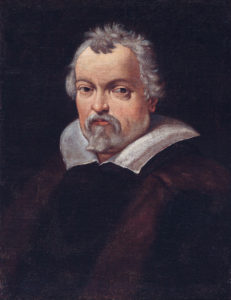 Today is the birthday of Ludovico (or Lodovico) Carracci (Bologna 21 April 1555 – 13 November 1619 Bologna); early-Baroque painter, etcher, and printmaker. His works are characterized by a strong mood invoked by broad gestures and flickering light that create spiritual emotion and are credited with reinvigorating Italian art, especially fresco art, which was subsumed with formalistic Mannerism.
Today is the birthday of Ludovico (or Lodovico) Carracci (Bologna 21 April 1555 – 13 November 1619 Bologna); early-Baroque painter, etcher, and printmaker. His works are characterized by a strong mood invoked by broad gestures and flickering light that create spiritual emotion and are credited with reinvigorating Italian art, especially fresco art, which was subsumed with formalistic Mannerism.
Gallery

-

Lamentation of Christ (ca. 1582).
-

Madonna and Child with St Francis of Assisi (1591) – known as “La Carraccina” due to the admiration of the young Guercino
-
Madonna and Child with Saints
-

Annunciation
-
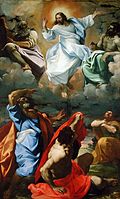
Transfiguration
-

Abraham and the Three Angels
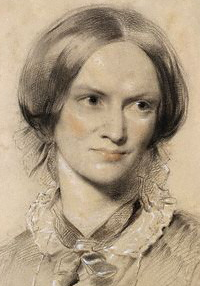 Today is the birthday of Charlotte Brontë (Thornton, West Riding of Yorkshire, England; 21 April 1816 – 31 March 1855 Haworth, West Riding of Yorkshire, England); novelist and poet, the eldest of the three Brontë sisters who survived into adulthood and whose novels became classics of English literature.
Today is the birthday of Charlotte Brontë (Thornton, West Riding of Yorkshire, England; 21 April 1816 – 31 March 1855 Haworth, West Riding of Yorkshire, England); novelist and poet, the eldest of the three Brontë sisters who survived into adulthood and whose novels became classics of English literature.
She enlisted in school at Roe Head in January 1831, aged 14 years. She left the year after to teach her sisters, Emily and Anne, at home, returning in 1835 as a governess. In 1839 she undertook the role as governess for the Sidgwick family, but left after a few months to return to Haworth where the sisters opened a school, but failed to attract pupils. Instead they turned to writing and they each first published in 1846 under the pseudonyms of Currer, Ellis and Acton Bell. Her first novel The Professor was rejected by publishers, her second novel Jane Eyre was published in 1847. The sisters admitted to their Bell pseudonyms in 1848, and by the following year were celebrated in London literary circles.
Before the publication of her third novel, Villette, Brontë received an expected proposal of marriage from Arthur Bell Nicholls, her father’s curate, who had long been in love with her. She initially turned down his proposal and her father objected to the union at least partly because of Nicholls’s poor financial status. Elizabeth Gaskell, who believed that marriage provided “clear and defined duties” that were beneficial for a woman, encouraged Brontë to consider the positive aspects of such a union and tried to use her contacts to engineer an improvement in Nicholls’s finances. Brontë meanwhile was increasingly attracted to Nicholls and by January 1854 she had accepted his proposal. They gained the approval of her father by April and married in June. Her father Patrick had intended to give Charlotte away, but at the last minute decided he could not, and Charlotte had to make her way to the church without him. The married couple took their honeymoon in Banagher, County Offaly, Ireland. By all accounts, her marriage was a success and Brontë found herself very happy in a way that was new to her.
Brontë experienced the early deaths of all her siblings. She became pregnant shortly after her marriage in June 1854 but died on 31 March 1855, almost certainly from hyperemesis gravidarum, a complication of early pregnancy which causes excessive nausea and vomiting.
Jane Eyre (1847)
Most true is it that “beauty is in the eye of the gazer.” My master’s colourless, olive face, square, massive brow, broad and jetty eyebrows, deep eyes, strong features, firm, grim mouth, — all energy, decision, will, — were not beautiful, according to rule; but they were more than beautiful to me; they were full of an interest, an influence that quite mastered me, — that took my feelings from my own power and fettered them in his. I had not intended to love him; the reader knows I had wrought hard to extirpate from my soul the germs of love there detected; and now, at the first renewed view of him, they spontaneously arrived, green and strong! He made me love him without looking at me.
- Jane (Ch. 17)
“Are you anything akin to me, do you think, Jane?”
I could risk no sort of answer by this time; my heart was full.
“Because,” he said, “I sometimes have a queer feeling with regard to you — especially when you are near to me, as now: it is as if I had a string somewhere under my left ribs, tightly and inextricably knotted to a similar string situated in the corresponding quarter of your little frame. And if that boisterous Channel, and two hundred miles or so of land, come broad between us, I am afraid that cord of communion will be snapped; and then I’ve a nervous notion I should take to bleeding inwardly.”
- Mr. Rochester and Jane (Ch. 23)
- Do you think I am an automaton? — a machine without feelings? and can bear to have my morsel of bread snatched from my lips, and my drop of living water dashed from my cup? Do you think, because I am poor, obscure, plain, and little, I am soulless and heartless? You think wrong! — I have as much soul as you — and full as much heart! And if God had gifted me with some beauty and much wealth, I should have made it as hard for you to leave me, as it is now for me to leave you. I am not talking to you now through the medium of custom, conventionalities, nor even of mortal flesh: it is my spirit that addresses your spirit; just as if both had passed through the grave, and we stood at God’s feet, equal — as we are!
- Jane to Mr. Rochester (Ch. 23)
- I am no bird; and no net ensnares me: I am a free human being with an independent will, which I now exert to leave you.
- Jane to Mr. Rochester (Ch. 23)
- My bride is here… because my equal is here, and my likeness.
- Mr. Rochester to Jane (Ch. 23)
- I care for myself. The more solitary, the more friendless, the more unsustained I am, the more I will respect myself.
- Jane (Ch. 27)
- Feeling… clamoured wildly. “Oh, comply!” it said. “… soothe him; save him; love him; tell him you love him and will be his. Who in the world cares for you? or who will be injured by what you do?” Still indomitable was the reply: “I care for myself. The more solitary, the more friendless, the more unsustained I am, the more I will respect myself. I will keep the law given by God; sanctioned by man. I will hold to the principles received by me when I was sane, and not mad—as I am now. Laws and principles are not for the times when there is no temptation… They have a worth — so I have always believed; and if I cannot believe it now, it is because I am insane — quite insane: with my veins running fire, and my heart beating faster than I can count its throbs.
- Jane (Ch. 27)
- Gentle reader, may you never feel what I then felt? May your eyes never shed such stormy, scalding, heart-wrung tears as poured from mine. May you never appeal to Heaven in prayers so hopeless and so agonized as in that hour left my lips; for never may you, like me, dread to be the instrument of evil to what you wholly love.
- Jane (Ch. 27)
- I can but die… and I believe in God. Let me try and wait His will in silence.
- Jane (Ch. 28)
- “I scorn your idea of love,” I could not help saying, as I rose up and stood before him, leaning my back against the rock. “I scorn the counterfeit sentiment you offer; yes, St. John, and I scorn you when you offer it.”
- Jane to St. John Rivers (Ch. 34)
- I have not much pride under such circumstances: I would always rather be happy than dignified.
- Ch. 34
- God did not give me my life to throw away.
- (Ch. 35)
- I recalled the voice I had heard; again I questioned whence it came, as vainly as before: it seemed in me — not in the external world. I asked, was it a mere nervous impression — a delusion? I could not conceive or believe: it was more like an inspiration.
- Jane (Ch. 36)
- Reader, I married him.
- Jane (Ch. 38)
And today is the birthday of Alfred Henry Maurer (April 21, 1868 – August 4, 1932); American modernist painter. He exhibited his work in avant-garde circles internationally and in New York City during the early twentieth century. Highly respected today, his work met with little critical or commercial success in his lifetime, and he died, a suicide, at the age of sixty-four.
Mac Tag

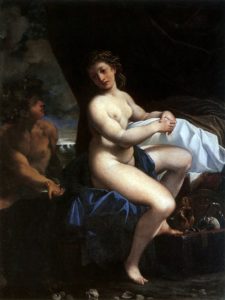
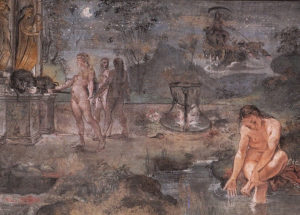
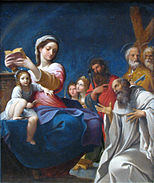

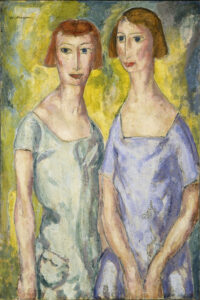
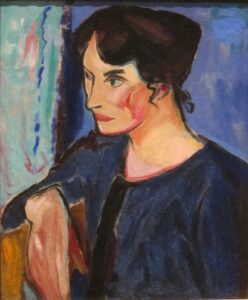
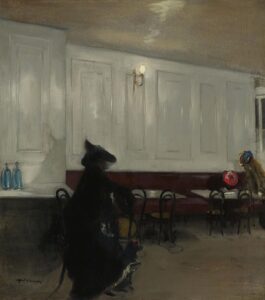



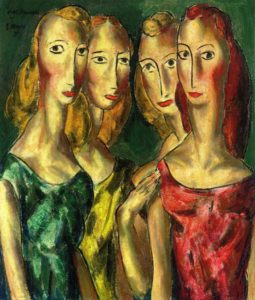
No Comments on "The Lovers’ Chronicle 21 April – distantly – art by Ludovico Carracci & Alfred Henry Maurer – birth of Charlotte Brontë"